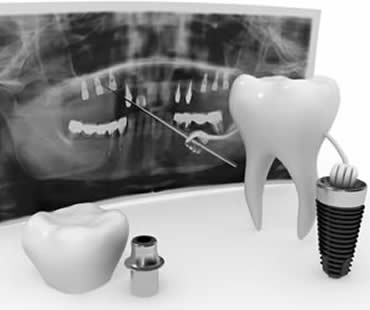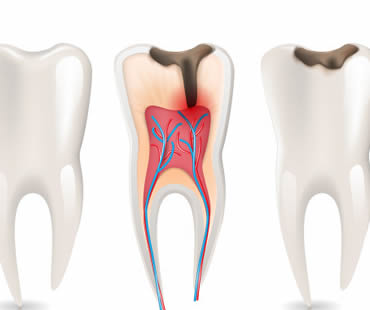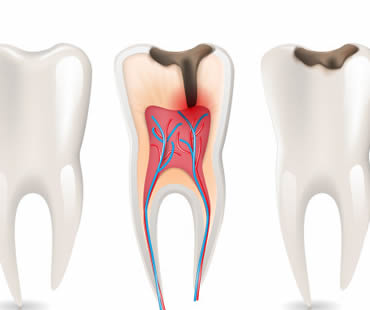
Nov 28, 2024 | Dental Topics 3, Implant Dentistry, Blog
Dental implants are the state-of-the-art restorative solution for missing teeth. They provide a stable base that is the next best thing to a natural tooth root. Because of this and other qualities, dental implants are rising in popularity each year as more and more people discover their convenience and stability.
Dental implants are replacement teeth, typically made of porcelain or a similar material, mounted on top of a titanium screw that is embedded into a patient’s jawbone. Over time, this screw will fuse directly with the bone in a process known as ossification. This fusion creates a tooth base that is so stable, it’s as good as a tooth’s natural roots.
Dental bridges can become dislodged and food may collect under the bridge, leading to discomfort and bacteria build-up. A dental implant goes all the way down, so there’s no “under” underneath to collect food and cause problems.
Most tooth restorations necessitate special ways of cleaning or flossing, and you have to be careful you’re doing all the right things to maintain your teeth properly. You care for a dental implant the same way you do for a natural tooth, by brushing and flossing, so you don’t even have to think about it when you’re cleaning your mouth.
The bones in your jaw are only healthy as long as you have healthy tooth roots in them. The tooth roots stimulate the bone, signaling it to stay full and healthy. Without the stimulation of the roots, the bone begins to shrink away. Dental implants preserve bone by acting as artificial tooth roots. The jawbone can’t tell the difference, and the bone stays strong and robust.
These factors and more are leading patients to turn to dental implants to address their missing teeth. Talk to your cosmetic dentist to see why dental implants are the perfect choice for you.
We look forward to seeing you in our Conyers dental office

Nov 12, 2021 | Dental Topics 3, Implant Dentistry, Blog
Dental implants are the state-of-the-art restorative solution for missing teeth. They provide a stable base that is the next best thing to a natural tooth root. Because of this and other qualities, dental implants are rising in popularity each year as more and more people discover their convenience and stability.
Dental implants are replacement teeth, typically made of porcelain or a similar material, mounted on top of a titanium screw that is embedded into a patient’s jawbone. Over time, this screw will fuse directly with the bone in a process known as ossification. This fusion creates a tooth base that is so stable, it’s as good as a tooth’s natural roots.
Dental bridges can become dislodged and food may collect under the bridge, leading to discomfort and bacteria build-up. A dental implant goes all the way down, so there’s no “under” underneath to collect food and cause problems.
Most tooth restorations necessitate special ways of cleaning or flossing, and you have to be careful you’re doing all the right things to maintain your teeth properly. You care for a dental implant the same way you do for a natural tooth, by brushing and flossing, so you don’t even have to think about it when you’re cleaning your mouth.
The bones in your jaw are only healthy as long as you have healthy tooth roots in them. The tooth roots stimulate the bone, signaling it to stay full and healthy. Without the stimulation of the roots, the bone begins to shrink away. Dental implants preserve bone by acting as artificial tooth roots. The jawbone can’t tell the difference, and the bone stays strong and robust.
These factors and more are leading patients to turn to dental implants to address their missing teeth. Talk to your cosmetic dentist to see why dental implants are the perfect choice for you.
Schedule your appointment at our Conyers dental office

Jun 4, 2021 | Dental Topics 3, Root Canal Treatment, Blog
Root canal therapy treats the interior of the tooth. The final step in root canal treatment is placing a permanent restoration to protect the tooth and restore it to full form and function. This procedure should be performed within one month of your root canal treatment to decrease the risk of re-contamination or breakage of the treated tooth. Having a permanent dental restoration placed will extend the success of root canal treatment by preventing damaging leakage or fracture.
The general condition of the treated tooth and the amount of tooth structure lost will determine if the tooth would be best restored with a permanent composite filling or a dental crown. For small cavities in front teeth with insignificant tooth structure loss, your dental professional may place a tooth-colored filling after a root canal procedure.
More often, your dentist will recommend the placement of a dental crown to restore a root canal treated tooth. Teeth that have had root canal therapy can be fragile, and a dental crown provides the best protection against future bacterial contamination and fracture. A dental crown is made in a laboratory and custom fit your tooth. Crowns are made of porcelain, metal, or a combination of the two. Dental crowns can be placed on front or back teeth, and are especially appropriate for molars that must withstand heavy chewing forces.
Having a root canal treated tooth restored with a dental crown or permanent filling will extend the success of your treatment. If you are showing symptoms of a damaged or diseased tooth, a properly performed root canal treatment and permanent restoration can save your tooth and extend its function for a lifetime.
We treat patients from Conyers and the surrounding area

Aug 13, 2021 | Dental Topics 3, Root Canal Treatment, Blog
There are many misconceptions about root canal treatment. This process is recommended when your tooth pulp is infected or damaged, and the treatment is needed to save your tooth. The damaged pulp is removed from your tooth and filled with a material that prevents future infections. A crown is often recommended to be placed over the tooth to complete the procedure and preserve the tooth. If your dentist recommends this treatment for you, it may save you some worry if you know the truth about the procedure.
Truth about the pain
Root canal treatment has advanced over the years, making it much less painful than its previous reputation. Anesthesia is used during the procedure, and most patients say it is no worse than getting a filling.
Truth about office visits
The procedure can usually be completed in just one or two office visits. Several factors impact the number of appointments, such as the extent of infection, complexity of the procedure, and need for referral to a different health care professional. Your dentist will be able to advise how many office visits are needed for your treatment.
Truth about symptoms
Your tooth does not absolutely have to be painful to indicate the need for a root canal. A dentist may diagnose a serious problem even when you don’t feel discomfort. That’s one reason regular checkups are important, so that issues can be caught.
Truth about cause
It is a myth that root canal treatment is caused by illnesses like heart disease, arthritis, or kidney disease. Medical research has proven these long-time myths to be untrue.
Truth about success
The benefits of root canal treatment can last a long time, even permanently. Sometimes patients experience broken teeth after treatment, but dentists attribute this to failure in the restoration or tooth construction instead of the root canal treatment itself. Patients who do not opt to get crowns tend to experience tooth breakage more often.
If you live in the Conyers area contact us today

Nov 18, 2022 | Dental Topics 3, Root Canal Treatment, Blog
There are many misconceptions about root canal treatment. This process is recommended when your tooth pulp is infected or damaged, and the treatment is needed to save your tooth. The damaged pulp is removed from your tooth and filled with a material that prevents future infections. A crown is often recommended to be placed over the tooth to complete the procedure and preserve the tooth. If your dentist recommends this treatment for you, it may save you some worry if you know the truth about the procedure.
Truth about the pain
Root canal treatment has advanced over the years, making it much less painful than its previous reputation. Anesthesia is used during the procedure, and most patients say it is no worse than getting a filling.
Truth about office visits
The procedure can usually be completed in just one or two office visits. Several factors impact the number of appointments, such as the extent of infection, complexity of the procedure, and need for referral to a different health care professional. Your dentist will be able to advise how many office visits are needed for your treatment.
Truth about symptoms
Your tooth does not absolutely have to be painful to indicate the need for a root canal. A dentist may diagnose a serious problem even when you don’t feel discomfort. That’s one reason regular checkups are important, so that issues can be caught.
Truth about cause
It is a myth that root canal treatment is caused by illnesses like heart disease, arthritis, or kidney disease. Medical research has proven these long-time myths to be untrue.
Truth about success
The benefits of root canal treatment can last a long time, even permanently. Sometimes patients experience broken teeth after treatment, but dentists attribute this to failure in the restoration or tooth construction instead of the root canal treatment itself. Patients who do not opt to get crowns tend to experience tooth breakage more often.
Our dental office is located in Conyers

Jul 9, 2021 | Dental Topics 3, Dental Information, Blog
Your smile is a valuable asset, but needs care to ensure it maintains its beauty. It’s essential to brush at least twice a day and floss once a day, but other factors can influence oral health. The following pointers could help you maintain a healthy smile for life.
Book Regular Dental Checkups
Most dentists recommend patients visit them twice a year, although some people may benefit from more frequent checkups. These visits are essential for your dentist in Conyers to examine your mouth, and can help detect any early signs of disease before they become a problem.
Watch Your Diet
A healthy balanced diet should include plenty of fruits and vegetables as well as lean proteins and low-fat dairy products. This will help provide your teeth and gums with all the nutrients needed to keep them strong and healthy, and promotes overall good health.
Quit Using Tobacco Products
Smoking or using tobacco products is well known for causing stained and discolored teeth, and smokers are more likely to have bad breath. In addition, smoking makes it harder for your gums to heal and increases the risk of oral cancer.
Quit Bad Oral Habits
Using your teeth to open packets, chewing on ice cubes and pens, and biting your nails can all cause small fractures and chips in your teeth. Your dentist can offer useful advice on quitting these habits.
Don’t Ignore Any Early Signs and Symptoms
If you develop toothache or notice your gums bleed when you brush or floss, contact your dentist in Conyers right away. These diseases are far easier to treat when detected early. Ignoring tooth sensitivity that could indicate a small filling is needed might mean you’ll eventually need a root canal, or even that you lose the tooth completely.
Protect Your Mouth
Popular activities such as football, soccer, basketball and hockey can all cause facial injuries. Even noncontact sports such as skateboarding may be hazardous. Your dentist can provide you with a custom-made mouth guard that will help protect your teeth and jaws during sports.
Schedule your appointment at our Conyers dental office







